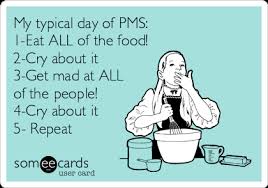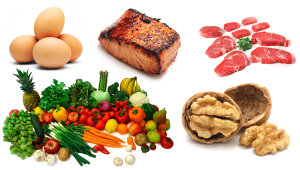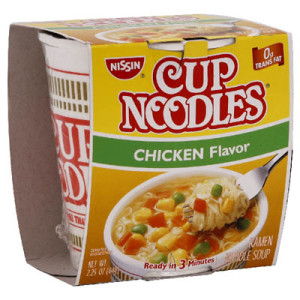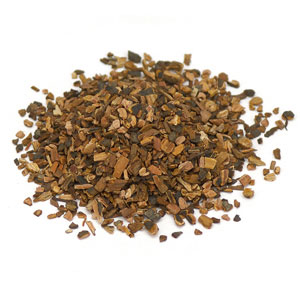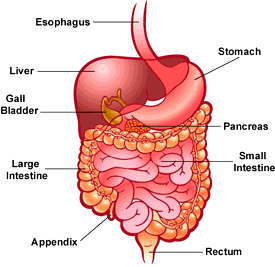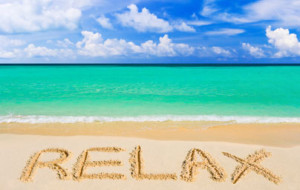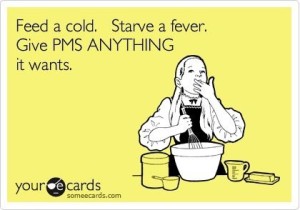 Ahhhh, PMS. That time of the month when everything just seems to suck- for yourself and everyone around you. There are so many jokes about women and being “crazy” and bitchy right around that time of the month. PMS is so common, it seems just about every woman suffers from it. It’s become accepted as something that can’t be avoided, something that’s just “a part of life” that we just have to deal with. I, myself, thought that PMS was unavoidable for years and I had it pretty severe. I thought the only thing I could do was pop some Motrin to mask the pain- and all the other symptoms I just had to deal with until they passed. It wasn’t until recently that I learned it doesn’t have to be this way. Over the past few months I’ve been working, nutritionally, to get rid of my PMS- and guess what? It worked! I’m still working on getting the cramps to be completely gone and I still have some breast tenderness to work on- but all my other symptoms are virtually gone!
Ahhhh, PMS. That time of the month when everything just seems to suck- for yourself and everyone around you. There are so many jokes about women and being “crazy” and bitchy right around that time of the month. PMS is so common, it seems just about every woman suffers from it. It’s become accepted as something that can’t be avoided, something that’s just “a part of life” that we just have to deal with. I, myself, thought that PMS was unavoidable for years and I had it pretty severe. I thought the only thing I could do was pop some Motrin to mask the pain- and all the other symptoms I just had to deal with until they passed. It wasn’t until recently that I learned it doesn’t have to be this way. Over the past few months I’ve been working, nutritionally, to get rid of my PMS- and guess what? It worked! I’m still working on getting the cramps to be completely gone and I still have some breast tenderness to work on- but all my other symptoms are virtually gone!
Do You Have PMS?
Symptoms (appearing about 7-10 days before period begins)
- Emotional Irritability
- Fatigue
- Acne
- Breast Tenderness
- Chocolate & Sweets Cravings
- Bloating
- Headaches
- Depression
- Back Pain
- Pelvic Pain
- Joint Pains
- Nausea
- Constipation
How to Stop PMS- Naturally!
There are many factors involved in PMS, and we’re all different, so there is no one-size-fits-all approach. That being said, I am going to share what I did to kick my PMS to the curb, which nutrients/herbs are particularly good for helping with PMS, dietary changes to make, and what other factors contribute to PMS. It may take some trial and error, but do not be discouraged, it is possible to live a PMS-free life! In fact, PMS is not normal! It is a sign of imbalance in the body, specifically in the endocrine system. If, after trying all my suggestions (meaning for at least 3 months), you’re still suffering from PMS, you may want to consider working with a practitioner one-on-one to get to the root of your individual issues.
Diet
The first step to kicking PMS to the curb is to eat a properly prepared, nutrient-dense diet. This means first getting all processed, man-made foods out of your diet. So, no refined flours, breads, sugars, pastas, fast foods, packaged foods, frozen TV dinners, etc. Eat only foods that are real and found in nature.
- Grass-Fed/Pasture-Raised meats, poultry, pork, eggs, game
- Wild Caught Seafood
- Bone Broth
- Organic Vegetables & Fruits
- Properly Prepared Nuts & Seeds (soaked, sprouted, or fermented)
- Properly Prepared Legumes (soaked, sprouted or fermented- if tolerated)
- Properly Prepared Grains (soaked, sprouted, or fermented- if tolerated)
- Full-Fat, Grass-Fed, Raw Dairy (if tolerated)
- Healthy Fats:
- Coconut Oil
- Animal Fats (lard, duck fat, tallow, etc)
- Grass-Fed Butter
- Grass-Fed Ghee
- Palm Oil (sustainably harvested)
- Extra Virgin Olive Oil
- Avocado Oil
- Nut Oils
- Cod Liver Oil
- Hemp Oil
- Flax Oil
It would be best to start out by also removing grains, dairy, and legumes for at least 30 days. After that, you can add them back, one at a time, to see how you tolerate them. If you don’t experience any issues, you can continue to enjoy those foods, otherwise keep them out of your diet.
If you want to say goodbye to PMS, it is essential that you remove sugar from your diet. Coming from someone who loves treats, I get how hard this part is. I spent years needing to eat something sugary immediately after every meal, and to be honest, I still struggle with sugar cravings sometimes. And many times I’ve found myself reaching for treats just purely out of habit, so I get it. Sugar is addicting and it’s hard to stop, but it will make a huge difference in the way you feel if you stop eating sugar. I use a supplement for hypoglycemia (aka low blood sugar) to help me with my sugar cravings (Bio-Glycozyme Forte from Biotics), but there’s also herbs, such as gymnema, which you put on your tongue and it completely removes the sweet taste. So even if you eat a piece of cake, you won’t be able to taste the sweetness, basically taking the joy out of eating sweets. You could also do Diane Sanfilippo’s 21 Day Sugar Detox to get rid of cravings.
Nutrients That Combat PMS
- Magnesium: Magnesium was monumental in helping me with my PMS. Taking magnesium from the day of ovulation until the day your period begins helps to drastically reduce PMS symptoms (along with proper diet, exercise, & relaxation). Magnesium is very calming and helps to relax muscles and ease pain from cramps. I drink a magnesium drink before bed during those days and it relaxes me right away and helps me sleep well.
- Vitamin B6: Vitamin B6 helps with bloating by clearing water out of the body with its diuretic effect. It’s important to take all the B vitamins together to keep them in balance. I take Bio-Glycozyme Forte from Biotics, which has B vitamins in it and also helps with sugar cravings.
- B Vitamins: The B Vitamins are helpful for anxiety, emotional irritability, mood swings, and bloating associated with PMS.
- Vitamin E: Vitamin E is helpful for pain management and for reducing bloating.
- Omega 3 & 6: These essential fatty acids are anti-inflammatory and help with pain management. I get mine in the form of cod liver oil and evening primrose oil. For other sources click here.
- Vitamin A: Vitamin A is useful for combating acne. I get mine from cod liver oil. You could also eat liver from grass-fed/pastured animals, and you could get some from grass-fed butter and ghee.
- Amino Acids: Amino acids help combat feelings of depression. Amino acids come from proteins. Great sources of protein are grass-fed/pastured meats, poultry, game, eggs, raw dairy, and nuts.
- Zinc: Zinc also helps combat feelings of depression and is linked to stomach acid production which is essential for proper digestive function. Oysters are a great source of zinc.
Foods That Make PMS Worse
- Sugar: I’ve already mentioned this, but sugar will make your PMS symptoms much worse! It’ll send you on a blood sugar rollercoaster, which will contribute to mood swings, headaches, and fatigue. It will also make cramps more severe and contribute to acne. Sugar also depletes magnesium stores- and as we discussed above, magnesium deficiency contributes to PMS symptoms.
- Processed Foods: Processed/Man-made foods wreak all sorts of havoc on the body, including aggravating PMS. If you truly want to get well, avoid these “foods” at all costs.
- Caffeine: This includes coffee, tea, soda, and energy drinks. I would be lying if I said that I don’t drink coffee, but I always keep it to just a cup in the morning. If I did cut coffee out (which I am going to do for two weeks, starting this week), I do think my PMS may be completely gone. (At this point, the only PMS symptoms that I still experience are mild breast tenderness and mild cramping- so I’d say I’m doing pretty damn well compared to the misery I used to face. I had pretty much every symptom on the list.)
- Alcohol: Especially wine and beer. I do drink wine, but only a couple times a month when I go out- not every night. I think alcohol is okay in moderation, but the less the better.
- Chocolate: Chocolate contains caffeine, which aggravates PMS. It is ironic that we crave chocolate when we have PMS, since chocolate actually makes it worse. Taking magnesium should get rid of chocolate cravings.
- Dairy Products: Most people are sensitive to dairy. It can contribute to acne, bloating, cramping, and other PMS symptoms. Unless you’re getting good quality raw dairy from grass-fed cows and you’re certain you can tolerate dairy, it’s best to avoid it, especially during the 7-10 days before your period begins.
- High-Salt Foods: Salt contributes to bloating, so go easy on the salt during this time of the month.
Herbs That Combat PMS
- Ginger Root: Helpful in relieving water retention and aids in circulation
- Valerian Root: Helpful for anxiety and irritability
- Sarsaparilla: Supports hormonal function
- Licorice Root: Mood booster
- Vitex (Chaste Berry): Helpful for breast tenderness
A Healthy Digestive System is Essential
In order for your body to be able to absorb and utilize all the nutrients we just discussed, your digestive system needs to be functioning properly. I go into detail about how digestion should work in this post. Say you don’t produce enough stomach acid, then you eat some good healthy proteins and now you can’t break them down into amino acids which are the form they need to be in for the body to be able to use them. If you’re experiencing digestive issues, such as IBS, than you’ll want to do the diet we discussed above, excluding grains, dairy, legumes, nuts, eggs, and any foods you are sensitive/allergic to, with the addition of at least 3 cups of bone broth per day. Always eat in a relaxed state and chew food very well. Also, avoid raw foods. Once you are feeling better you can reintroduce eggs, nuts, legumes, etc, one at a time to see how you react to them. Digestive issues can be hard to fix (I have IBS, so I definitely empathize), and there are many diet protocols out there you can try, or you may like to work one-on-one with a practitioner (which is what I am currently doing for myself).
Other Factors
Stress! Stress definitely makes PMS worse. Be mindful during this time of the month and do relaxation techniques such as the following:
- Meditation: Meditation calms the mind and helps to alleviate stress and anxiety. Practicing mediation over a long period of time can help you handle stress better. Meditation is a skill that takes a lot of practice to master.Learn how to meditate here.
- Yoga: The deep breathing done in yoga is relaxing in and of itself. Yoga combines deep breathing, stretching, meditation, spirituality, and fitness to give you a truly relaxing experience. Yoga should be done everyday in addition to your regular exercise routine (I don’t do it everyday, but I try to do the best I can with it). You really can notice the difference in how you feel when you start missing days. Yoga can help you to reduce stress, sleep better, reduce cortisol (adrenal hormone) levels, reduce anxiety and muscle tension, increase strength and flexibility, and grow spiritually.
- Belly Breathing: Belly breathing is the natural way we are supposed to breathe. As we grow, we tend to start taking shallow breaths instead of deep breaths that fill our entire lungs. Set aside 10 minutes a day where there will be no distractions. Lie down or sit comfortably and place your hands just under your belly button. Breathe normally and notice the way your breath feels- then consciously breathe deep so that your stomach seems to inflate. Do not expand your chest when you breathe- just your belly.
- 3/3/3: This is a technique I use when I am panicking and it helps me to calm down within a minute. Breathe in for 3 counts, hold the breath for 3 counts, and exhale for 3 counts. Repeat as necessary. This helps because you are focusing on your breathing instead of the situation that is making you nervous.
- Repeat Affirmations: Choose a word or phrase that makes you feel calm and repeat it to yourself to bring your mind into a state of meditation. Choose a place where you will not be disturbed for 15-20 minutes. Sit or lie down and close your eyes. Take slow, deep breaths and when you feel ready, begin repeating your chosen word/phrase to yourself. You mind will wander and start having thoughts- notice them, let them go and continue repeating your chosen word/phrase. Do this once or twice a day.
- Exercise: Exercise is an excellent stress reliever. You don’t have to be a superstar CrossFitter to receive the benefits of exercise. Just make sure you move everyday even if it’s as simple as going for a walk. Push yourself, but don’t go beyond your limits.
- Massage: Getting a massage is a great way to reduce stress! One of my favorite ways. Getting a massage lowers your heart rate, releases toxins, relaxes muscles, releases serotonin, increases the production of endorphins, and lowers cortisol levels.
- Soy Candles: Light some soy candles that are made with essential oils, such as lavender or eucalyptus. These scents are very calming and a great use of aromatherapy. I always light myself a stress-relieving candle when I’m feeling overwhelmed or have a lot of work to get done. It really does help me to feel much calmer.
- Spend Time in Nature: Being outside in nature makes us feel calm. Spend the day fishing, hiking, swimming, etc to enjoy all the benefits of being outdoors. Especially if you live in a city, take some time to enjoy these beautiful places whenever you can. Notice your mood and how much better you feel when you are in a forest or walking by a lake or ocean.
- Remove Toxic Influences: This may be substances such as drugs or alcohol, or toxic people. You may not be able to remove toxic people from your life completely, but you’ll need to find a better way to deal with them. Let them know that you need space sometimes and walk away when you need to.
It’s also important to make sure you are getting enough sleep and taking some time each day to disconnect from technology.
Was this information useful to you? Let me know in the comments!
See also:
Stress Got You Down?
The Truth About Stomach Acid
Bone Broth: The Mineral-Rich Superfood
What’s the Deal With Omega 3?



